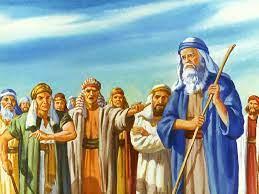The Sin of Kadesh-barnea
13:1 to 14:45
The decisive rebellion.

The spy story in Numbers 13-14 plays a crucial role within the unifying literary and theological structure of the book. It is closely and directly linked to the two census lists in Numbers Chapter 1 and Numbers Chapter 26 and is recalled as important ways in the second half of the book in Chapters 32 and 34. The spy story is explicitly linked to the first census list in Numbers Chapter 1 through its use of the specific age formula, every single one of you who were included in the census over the age of twenty (14:29). The same phrase is used repeatedly as a formula throughout the numbering of the twelve tribes in the first chapter of Numbers. The spy story is also explicitly tied in with the second census list in Chapter 26. An addendum at the end of the census in 26:63-65 reads: These are the ones counted by Moshe and Eleazar the priest, who took a census of the people of Isra’el in the plains of Mo’av by the Jordan across from Jericho. But there was not a man among them who had also been included in the census of Moshe and Aaron the priest when they enumerated the people of Isra’el in the Sinai Desert; because Adonai had said of them, “They will surely die in the desert.” So there was not even one of them, except Caleb and Joshua.
The addendum clearly alludes to the spy story of Numbers Chapters 13 and 14 in which the definitive judgment of the Exodus generation occurred. The spy story has clear associations with the two pillars of the structure of the book of Numbers, that is, the first census list in Chapter 1 and the second census list in Chapter 26. The theme of the spy story plays a pivotal role in the central narrative in defining the theme of the book of Numbers as a whole – the death of the Exodus generation and the birth of a new generation of hope on the edge of the Promised Land. We will note other references to the spy story later in Chapters 32 and 34, further strengthening the argument for its central place in the theme and structure of Numbers.225
These verses are displayed in a chiastic fashion (see Ac – Numbers from a Messianic Jewish Perspective: Chiasm and introversion). The inverted symmetry of this section of Scripture is clear. The selection of unfaithful spies led to the defeat by the Amalekites (A-A), God allowed the ten tribes to spy out the Land in His grace (B-B), but the report of the spies was negative so Moshe had to intercede (C-C). Faith and obedience are the main points (D).
A The selection of the spies (13:1-16)
B Spying out the land (13:17-25)
C The report of the spies (13:26-33)
D Faith and obedience (14:1-4)
C Moshe intercedes (14:5-20)
B Gods Response: discipline, not wrath (14:20-38)
A Defeat by the Amalekites (14:39-45)



Leave A Comment